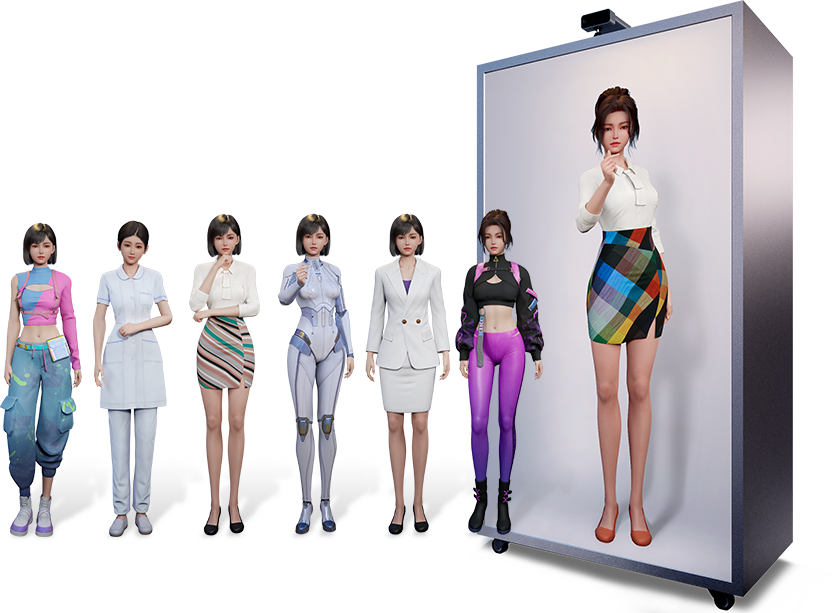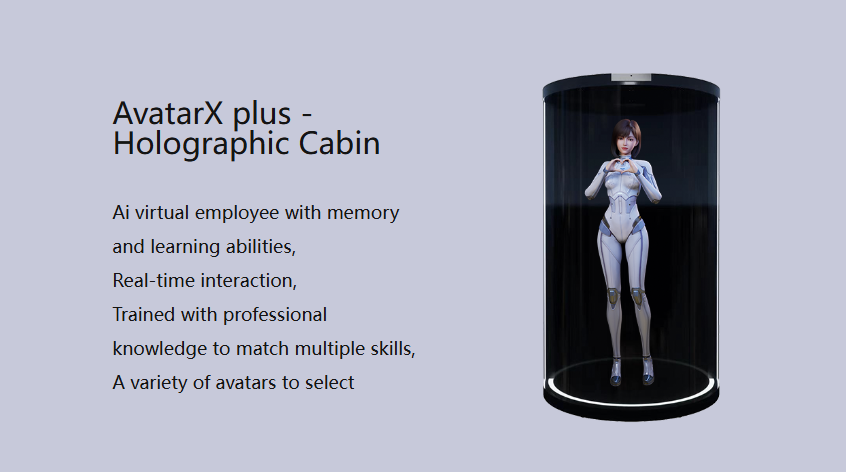 2024-09-13 15:26:23
2024-09-13 15:26:23

In the ever-evolving world of technology, self-service kiosks have become a key tool for enhancing customer experiences. From airports to retail stores, kiosks offer customers convenience, faster service, and reduced wait times. However, traditional kiosks, while functional, are now being overshadowed by a new generation of AI-powered 3D Digital Human Kiosks. These AI-powered kiosks bring human-like interactions into self-service, blending cutting-edge AI technology with hyper-realistic 3D avatars. One company leading this innovation is AvatarX Plus, pushing the boundaries of what kiosks can achieve in the modern world.
In this article, we explore how AI-powered kiosks and 3D digital humans are revolutionizing industries, the advantages they offer over traditional systems, and why businesses are rapidly adopting these technologies.
An AI-powered kiosk integrates artificial intelligence into the self-service experience, enabling machines to perform tasks previously requiring human assistance. Unlike conventional kiosks that rely on manual input and basic software, AI-powered kiosks can interpret natural language, make real-time decisions, and engage in human-like conversations. These kiosks are often equipped with speech recognition, gesture control, and machine learning, allowing them to adapt to customer needs and preferences dynamically.
AI Self-Service Kiosks are an evolution of traditional self-service systems that only facilitated basic transactions such as payments or check-ins. AI-powered kiosks go a step further by offering advanced capabilities, such as understanding and responding to spoken language, interpreting body language, and offering personalized experiences based on customer interactions.
These advancements allow for a more intuitive, user-friendly interface that feels closer to interacting with a human being rather than a machine.
At the core of this revolution is the integration of 3D Digital Humans. These are lifelike avatars that mimic human expressions, gestures, and emotions. They bring a new level of realism to the self-service experience by providing human-like interaction and engagement. For instance, a 3D digital human in a retail kiosk could act as a virtual assistant, helping customers browse products, answer questions, and make recommendations based on their preferences.
The 3D digital human serves as the face of the AI-powered kiosk, making it more approachable and less intimidating for users who may be hesitant to engage with a machine.
AI Self-Service Kiosks with 3D digital humans offer several distinct advantages for businesses and customers alike:
Enhanced User Experience
The lifelike nature of 3D digital humans makes interactions feel more personal and intuitive. Customers can ask questions naturally, and the digital human responds in a conversational tone, creating a seamless experience.
24/7 Availability
These kiosks can operate 24/7 without the need for human intervention. Businesses can offer round-the-clock service to customers, ensuring they receive assistance at any time of the day.
Cost-Effective
With AI-powered kiosks, businesses can reduce their reliance on human staff for routine tasks, thereby lowering operational costs. Over time, the initial investment in AI technology pays off through increased efficiency and reduced labor costs.
Multilingual Support
AI-powered kiosks can easily switch between languages, making them ideal for use in international settings like airports, hotels, and retail stores.
Data Collection and Insights
AI kiosks can collect valuable data on customer preferences and behaviors. This data can be analyzed to improve services, tailor marketing strategies, and enhance the overall customer experience.
In retail environments, AI-powered kiosks can help customers locate items, suggest products based on past purchases, and even process payments. The integration of 3D digital humans makes the experience more engaging, as customers feel they are interacting with a knowledgeable salesperson rather than a machine.
Hotels and restaurants are also embracing AI-powered kiosks. Guests can use these kiosks for check-ins, room service orders, and even tourist recommendations. The 3D digital human avatar greets guests with a friendly smile and can assist with any inquiries in multiple languages.
In healthcare, 3D digital human kiosks assist with patient check-ins, appointment scheduling, and even basic medical inquiries. The AI component can help triage patients, directing them to the appropriate resources without the need for front desk staff.
Airports and train stations are leveraging AI-powered kiosks for check-ins, ticketing, and providing travel information. The 3D avatars ensure passengers feel supported and informed throughout their journey.

AvatarX Plus is a pioneer in the development of AI-powered 3D digital human kiosks. Their products offer several key features that set them apart from competitors:
To better understand the advantages of AI-powered kiosks, here’s a comparative table:
| Feature | AI-powered Kiosk | Traditional Kiosk |
|---|---|---|
| Interaction Method | Voice, gesture, 3D digital humans | Touchscreen only |
| Personalization | High – Learns from user preferences | Low – Limited to basic functions |
| Emotional Engagement | Yes – Recognizes and responds to emotions | None |
| Multilingual Support | Yes – Supports multiple languages | Limited |
| Availability | 24/7 | Depends on operational hours |
| Cost Efficiency | High – Reduces human staff needs | Moderate – Requires human intervention |
| Complex Task Handling | Can handle complex inquiries and tasks | Limited to basic transactions |
AI-powered kiosks in retail environments help customers find products quickly, make personalized suggestions, and even process payments. By reducing the need for human staff to assist with every inquiry, these kiosks allow retailers to serve more customers with fewer resources.
In healthcare settings, AI-powered kiosks reduce wait times by allowing patients to check in, schedule appointments, and access medical records independently. The 3D digital human’s ability to recognize patient emotions and respond empathetically enhances the patient experience.
As AI technology continues to advance, the future of self-service kiosks looks brighter than ever. We can expect even more lifelike 3D digital humans, better emotional recognition, and more sophisticated AI that can handle increasingly complex tasks. With companies like AvatarX Plus leading the charge, AI-powered kiosks are set to become a staple in various industries, offering unmatched efficiency, personalization, and customer satisfaction.
